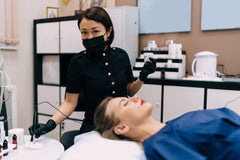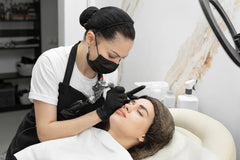📦 Free Shipping for orders of $300 or more. USPS Priority Mail Express days only applies when ordered before 1:00 pm California time. 🔷 Become a BC Member and receive free shipping on all orders no minimums! Free shipping is only offered to USA and Puerto Rico orders. Learn More >> 🔷
📦 Free Shipping for orders of $300 or more. USPS Priority Mail Express days only applies when ordered before 1:00 pm California time. 🔷 Become a BC Member and receive free shipping on all orders no minimums! Free shipping is only offered to USA and Puerto Rico orders. Learn More >> 🔷
Is Microblading Safe? The Risks of Microblading

Is Microblading Safe? The Risks of Microblading
- Admin .
- -
- Apr, 17 , 22

Is microblading safe? That’s one of the first questions that many people interested in microblading always ask. And a good technician will be able to reassure their client that the technique is safe and sanitary. And because it involves making light cuts on the skin, many microblading artists are trained to ensure that they do it in the safest way possible.
Risks of Microblading
No beauty treatment is free of side effects. And because the microblading procedure involves cutting into the skin, it has some risks. So it’s better to know about these risks before you commit to the procedure. Some of these risks include:
Infection
If your microblading technician uses unclean equipment or water, they can spread harmful bacteria such as staphylococcus and viruses like HIV, herpes, or hepatitis. There’s also the possibility that the ink they are using is contaminated by mold or bacteria.
Allergic reactions
If you don’t know the ingredients used in the ink, you also run the risk of getting an allergic reaction once it’s in contact with your skin. For example, you could get an itchy rash or excessive swelling. There are also instances where the microblading artist has to mix pigments to get the right color. So even if one pigment doesn’t have the ingredient that triggers your allergies, the mixed-in pigment could have it.
Granulomas
A granuloma is a tiny cluster of white blood cells and other tissues reacting to infections, inflammations, or foreign objects. And with microblading, the technician inserts a foreign substance under your skin, which is the microblading ink. And your body may try to protect you by forming an inflammatory knot or granuloma around the area. There’s also the risk of sarcoidosis, which is when you get more than one granuloma. The treatment for these would be steroids or antibiotics.
Keloids
Keloids are scars that are bigger than average. While they don’t usually happen on the face, you may get them from microblading if you’ve had keloids before.
MRI problems
It’s an uncommon occurrence, but tattooed skin may swell or burn if you get an MRI. However, the skin will go back to normal after the procedure. So if you need to get one, let your doctor or radiologist know about your microbladed brows.
Keep in mind that the FDA does not regulate tattoo or cosmetic salons. But they do keep an eye out for any complications. So if you get a bad reaction from microblading, let the FDA know.
Risks to pregnant women
And if you’re pregnant and lactating, it’s best to steer clear from getting the procedure as well. Since there are no studies on the effects of the pigments used in microblading and how these chemicals might affect your baby. Additionally, pregnancy hormones also affect your blood circulation, making you more likely to bleed. And excessive bleeding can also result in getting subpar results when microblading. Additionally, some pregnant women also experience melasma or hyperpigmentation. This could result in the technician choosing the wrong color for your brows.
Conclusion

Is microblading safe? Yes, if you go to a certified technician who prioritizes your safety by keeping their workplace sanitary and using the best quality microblading products. Before getting the procedure, take the time to consult with your technician. And if you’re a microblading technician looking for quality microblading items and accessories, check out our collection of Phibrows products here.
← Older Post Newer Post →
Search
Recent Post
From Studio to Pe...
Nov 12, 2025Color Correction ...
Oct 15, 2025Permanent Makeup ...
Sep 05, 2025Archive
- September 2025
- April 2025
- February 2025
Tags
Custom Menu
Added to cart successfully!
FROM_JS
Compare Product
Countdown message




